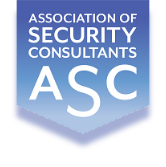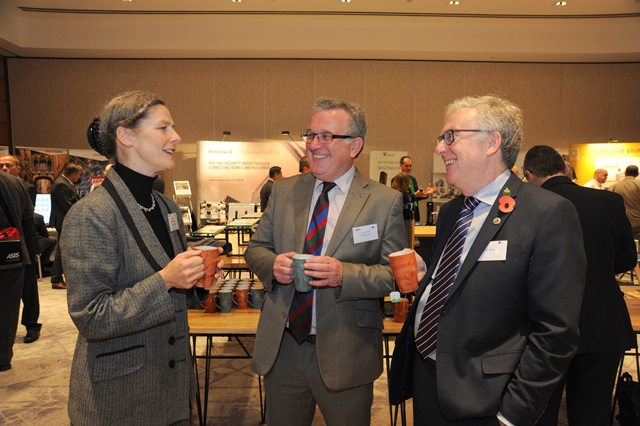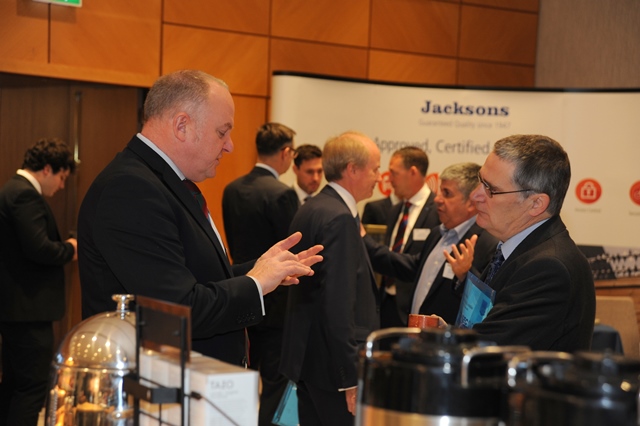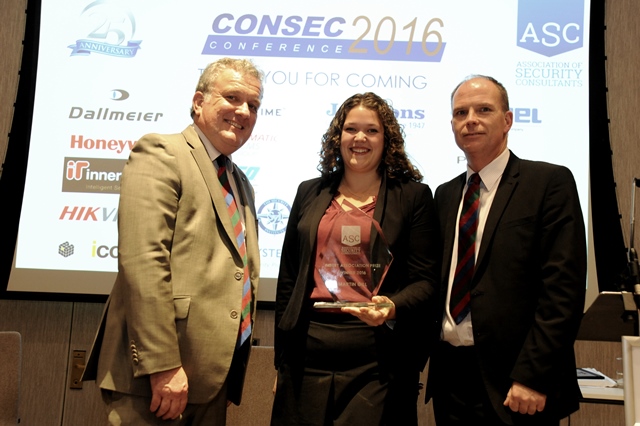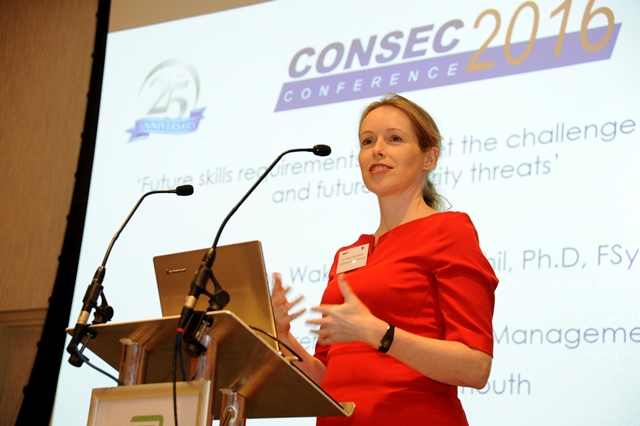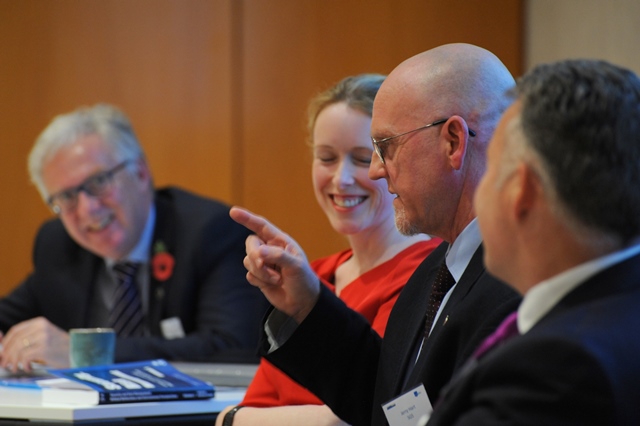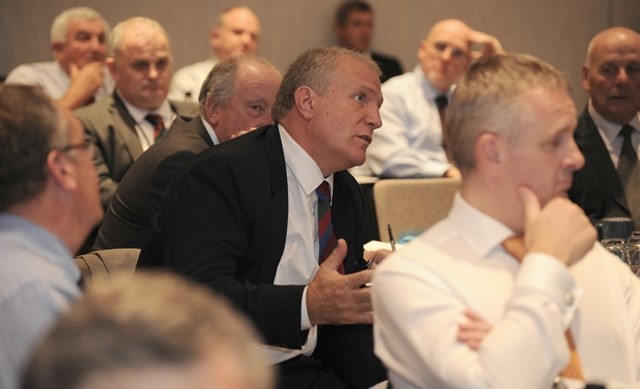
The retired SIA chairman Bill Butler again appeared as the conference chair. Bill, who has a long held interest in security, assisted in putting the programme together and wanted specifically to draw on the question of the future skills that would be required in the security field. Bill’s services to the ASC and to CONSEC were rewarded with his appointment as an Honorary Member of the ASC.
The keynote speaker, Jane Cannon MBE, comes to government as Director of Security Sector Engagement. An engineer by profession, Jane has a long and successful career in the commercial sector and understands it very well. Jane spoke with passion about building trust between government and engaging the private sector in achieving objectives that support UK policy and in making that knowledge available in government circles. Jane mentioned a specific workstream, particularly relevant to the commercial security sector, the new Joint Security Resilience Centre, which would be near Cambridge and work to support the government’s review of the “contest” strategy. This initiative is attracting significant government investment of £11m, matched by private sector sponsorship. It aims will include the provision of better two-way communication between government and industry.
CONSEC’s second speaker provided a global security forecast. Frances Nobes, as Head of Risk Analysis at World Vision, needs to take a truly global view in her day to day business which spans operations in over 90 countries. Speaking on the persistent threats of political and civil unrest, terrorism, and preparation for spontaneous incidents, Frances emphasised that these risks had to be properly assessed and managed by organisations and the essential corporate responsibilities for their duty of care to employees.
CONSEC delegates enjoyed a comprehensive exhibition and practical demonstrations from a broad range of providers during the breaks, and the opportunity to network with fellow security professionals. Old acquaintances were renewed and fresh ones made with positive feedback on the quality of business-related introductions.
John Vine, former Chief Constable of Tayside and the first Independent Inspector of Borders and Immigration, was the next speaker. This topical subject, which has attracted a lot of knee-jerk reaction in the media, was put in perspective by John, drawing on his experience as Chief Inspector. He pointed out that the current mass movement of populations for a variety of reasons is greater than at any time since the Second World War (40 million displaced people following WW2, 65.5 million today). The removal of internal borders, e.g. in the European Schengen area to facilitate commerce, has implications in a time of heightened security threat. As well as educating the audience, John gave practical examples of security issues relating to establishing individual identity, using and developing intelligence, and enhancing sensible border control activities.
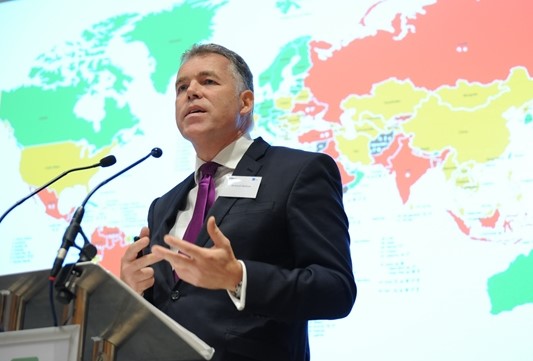
Who better to speak on terrorism than Richard Walton, who recently vacated the role of Head of SO15 Counter Terrorism Command? Richard, now a consultant, speaker and writer on terrorism is a recently appointed member of the ASC. Richard gave a frank overview of the causes of terrorism. He emphasised that terrorism is a criminal activity and in civilised societies must primarily be combatted through the Rule of Law and criminal procedure. He referred to specific terrorist cases and drew attention to the UK’s global leadership in disrupting and detecting terrorism, keeping populations safe at home and overseas. He predicted a continuation of terrorist attacks, possibly more sporadic and designed to shock.
CONSEC’s chosen venue The Marriott Hotel, Heathrow Airport proved once again what a fine choice it is over a superb lunch, and a completely revamped and modernised conference centre. The exhibition stands were busy with almost 200 delegates and exhibitors circulating.
The afternoon commenced with awards and presentations. The finalists for the ASC Imbert Award for Security Associations were Prof Martin Gill (nominated by ASIS and Security Institute), Lynn Wats Plumkin (nominated by IPSA) and Pauline Nortsrom (nominated by BSIA). A close-run race, and each a winner in their own right, the overall winning prize went to Prof Martin Gill of Perpetuity.
Three new members of the ASC were welcomed and received their membership certificates from Joe Connell and, of course, trademark ASC tie. These were Richard Walton, John Lewes and Maurice Humphries.
The afternoon speaking commenced with a presentation from the Centre for the Protection of Critical National Infrastructure (CPNI) on the insider threat, particularly in the context of Civil Aviation. As usual, the security and procedural advice from CPNI was clear and logical, referring to ongoing personnel security, vigilance campaigns and the threats from social engineering, and supported by practical advice and guidance. Special comment was made by members of the audience on how useful CPNI’s many security advisory products are in practice.
No security conference is complete without reference to cyber. This year’s CONSEC heard from Dominic Cockram, CEO of Steelhenge and a specialist in Crisis Management. Dominic emphasised the contribution made to cyber threat by human interaction, with 80pc of events due to error, lack of awareness or malicious intent. He used the Talk Talk incident as a case study to outline the various challenges faced during a cyber crisis eg. the uncertainty, unfamiliarity, speed and complexity, and the consequences needing external help, public and staff outrage, loss of trust. He outlined how cyber-crime can, in effect, make the victim look like the villain. Dominic’s advice included knowing what information is at risk, what that risk is, having a crisis leadership structure, and rehearse, rehearse, rehearse!
The final CONSEC speaker was Dr Alison Wakefield from University of Portsmouth. Having heard the range of topical threats and risks both in front and over the horizon, Alison’s task was to assess what future skills may be necessary in the security sector and how best to harness and develop them. Alison referred to the move from the original ‘Green Shack’ unsophisticated security solutions toward the ‘Total Asset Protection’ approach of today. She identified the need for security departments and professionals to show enhanced thinking and capabilities, and for end users to be helped to become more security aware, especially relating to opportunities and risks surrounding information. Enhanced information literacy may lead to greater learning opportunities, specialisation and possible outsourcing.
CONSEC 2016 concluded with a panel of Dr Alison Wakefield, Richard Walton and Jerry Hart, Global Risk Analyst at SGS, chaired by Bill Butler. With Alison as the academic, Richard as a practitioner, Jerry who is completing a work based learning doctorate seemed to fill the evolving role of ‘Pracademic’. According to Alison, this trend for practitioners to develop skills, experience and learning through academia is influencing the developing security environment. Jerry added, that being the practitioner is about asking ‘How?’, whereas the academic element is about asking Why?’ All three of the panel spoke positively about the UK’s leading role in public sector security, with police and military solutions admired the world over. They agreed this may also apply to the UK’s private security sector, acknowledging the difficulty in defining competence over qualification. The efforts of the keynote speaker Jan Cannon in her role at the Home Office are to be welcomed in this regard.
Bill Butler concluded by setting out his view on the themes that had emerged:
• Recognising the central role of the individual, as victim, as migrant, as employee.
• The importance of trust and cooperation.
• The challenge to our traditional conceptions of civil rights and the sensitivities of recognising this.
• The significance of the role of social media.
Overall, CONSEC succeeded in its objectives of encouraging the ‘Learning, Sharing and Networking’ required to keep the security industry ahead of the game. It gave participants a lot to think about on their immediate horizon, and permitted them a peep over the top at what may be coming!
About the ASC
The association’s next event is a business group gathering on November 17 at Queens Room, Armoury House, City Road, London EC1Y 2BQ. For more on the ASC visit http://securityconsultants.org.uk/.
